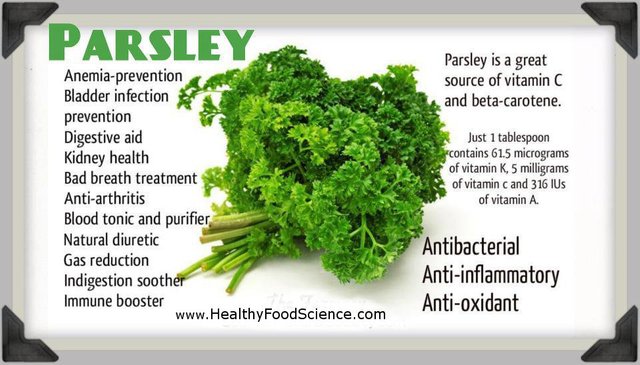PARSLEY is an herb that originated in the Mediterranean region of southern Italy, Algeria, and Tunisia. This herb is known scientifically asPetroselinum hortense and Petroselinum crispum and it belongs to the family Apiaceae.

Health Benefits Of Parsley
Parsley, known for its use as a garnish, has many nutrients that provide health benefits to people. Some of these benefits include:
Anti-Diabetic Properties: Traditionally, parsley was used as a medicine for diabetes in Turkey. In order to scientifically validate this claim,research was conducted at Marmara University in Istanbul, Turkey. The research showed evidence that diabetic rats that were given parsley actually showed a decrease in their blood sugar levels over a period of a month. The research indicates that it can be used for diabetic control.
Controls Rheumatoid Arthritis: Parsley has also been particularly effective against rheumatoid arthritis. Compounds such as vitamin C and beta-carotene found in the herb possess anti-inflammatory properties that help in controlling arthritis. Consuming it regularly is also believed to speed up the process of uric acid removal, which has been linked to symptoms of arthritis.
Anti-Carcinogenic Properties: Zheng, Kenney and Lam from LKT Laboratories in Minneapolis, Minnesota have extracted a compound named myristicin, which is a phenylpropane compound, from parsley oil extract. Preliminary investigation into the myristicin compound had revealed that it has anti-carcinogenic properties. Myristicin extract from the herb was only tested on rats and human application of this compound still remains to be seen.
Anti-Inflammatory Properties: Parsley has traditionally been used in the Mediterranean region for toothaches, bruises, insect bites, and rough skin. According to preliminary studiesconducted at the King Saud University by Al-Howiriny et al., parsley displayed anti-inflammatory and anti-hepatotoxicity properties. The anti-inflammatory properties reduce in internal inflammations, while the anti-hepatotoxic properties help to cleanse the liver.
Osteoporosis: Parsley is effective in cases of osteoporosis and is helpful in maintaining bone health. Osteoporosis occurs due to depleted levels of calcium in the bones and also due to an amino acid called homocysteine. This amino acid can be broken down by the intake of folic acid. Due to this aspect, apart from dairy products and vegetables, parsley is regarded as one of the best sources of calcium. It also contains an appropriate amount of folic acid, which may break down homocysteine.
Diuretic effects: For many centuries now, parsley has been used as a diuretic that helps in controlling various diseases such as kidney stones, urinary tract infections, and gallbladder stones. Edema is a medical condition where a patient retains fluid in the body more than what he or she is supposed to hold under normal circumstances. The body swells because of fluid accumulation. If you are afflicted by this condition, a few teaspoons of parsley juice can provide some quick relief. The roots of the herb are also very much useful in counteracting kidney stones. Adding its roots to boiling water and drinking it on a daily basis is known to be effective as a general cleanser for the body.
Strengthens the Immune System: The vitamins,minerals, and antioxidants found in parsley are helpful for strengthening immunity. Vitamins such as vitamin C, vitamin A, vitamin K, folate, and niacin each act on different aspects of the immune system. Vitamin A acts directly on lymphocytes or white blood cells, thereby increasing their effect. The chlorophyllcontained in it has anti-bacterial and anti-fungal properties as well. Studies have showed that the herb contains antioxidant properties and antibacterial properties, making it an ideal source for various home remedies.
Possible Risks of Eating Parsley
Consumption of parsley especially in large quantities, may have side effects and disadvantages. Some of them include the following:
Risky for Pregnant Women: The consumption of large quantities of the herb may induce uterine contractions during pregnancy. At any stage of pregnancy, this can be very risky. Large amounts of parsley are not safe for women who are breastfeeding. Avoiding excessive consumption during pregnancy and breastfeeding is strongly advised.
Oxalate Over-consumption: Parsley has a high quantity of oxalates. This high concentrationcan be particularly problematic for people who suffer from kidney stones.
Other: It may make skin extra sensitive to sun, which may cause the formation of a rash.
source: https://www.organicfacts.net/health-benefits/herbs-and-spices/health-benefits-of-parsley.html
Hi! I am a content-detection robot. I found similar content that readers might be interested in:
https://www.organicfacts.net/health-benefits/herbs-and-spices/health-benefits-of-parsley.html
Downvoting a post can decrease pending rewards and make it less visible. Common reasons:
Submit